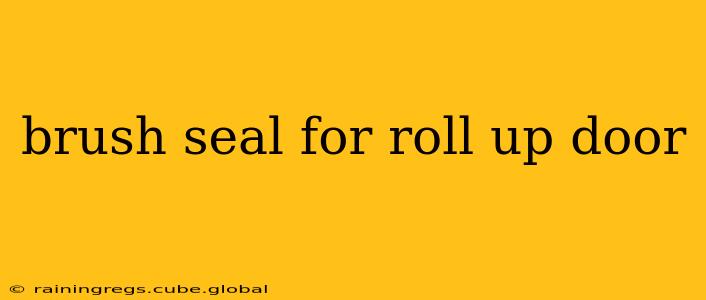Roll-up doors, whether in commercial garages, industrial settings, or even residential applications, require robust sealing to maintain optimal functionality and environmental control. A critical component in achieving this is the brush seal. This guide delves into the world of brush seals for roll-up doors, exploring their benefits, types, installation, and maintenance.
What are Brush Seals for Roll-Up Doors?
Brush seals are flexible, weather-resistant seals composed of bristles affixed to a backing material. These bristles create a dense barrier against dust, debris, insects, air, and moisture, effectively sealing the gaps around the door's vertical tracks and the bottom edge. This prevents drafts, enhances energy efficiency, and protects the interior environment from the elements. Unlike other seal types, brush seals offer a degree of give, accommodating minor misalignments in the door's operation without compromising sealing efficiency.
What are the Benefits of Using Brush Seals on Roll-Up Doors?
The advantages of incorporating brush seals into your roll-up door system are substantial:
- Improved Energy Efficiency: By preventing air leakage, brush seals significantly reduce energy loss, lowering heating and cooling costs.
- Enhanced Weather Protection: They shield the interior from rain, snow, wind, and dust, protecting equipment and maintaining a comfortable environment.
- Reduced Noise Pollution: Brush seals effectively dampen external noise, creating a quieter interior space.
- Pest Control: The dense bristle barrier prevents insects and rodents from entering the building.
- Increased Security: While not a primary security measure, brush seals can add a small layer of resistance to unauthorized entry attempts.
- Extended Door Lifespan: By protecting the door and its components from the elements, brush seals contribute to a longer service life.
What Types of Brush Seals are Available for Roll-Up Doors?
Several types of brush seals cater to various roll-up door applications and requirements:
- PVC Brush Seals: A popular choice due to their durability, flexibility, and resistance to many chemicals. They are suitable for a wide range of environments.
- Rubber Brush Seals: Offer excellent resilience and sealing capabilities, particularly in harsh conditions. They can withstand significant wear and tear.
- Polypropylene Brush Seals: Known for their lightweight nature, and resistance to UV degradation, making them a good option for outdoor applications.
- Custom Brush Seals: For specialized applications, custom-designed brush seals can be manufactured to precise specifications, ensuring a perfect fit.
How Do I Install Brush Seals on My Roll-Up Door?
Installation methods vary depending on the type of seal and door design. Generally, the process involves:
- Measuring and Cutting: Carefully measure the required length and cut the brush seal to size, ensuring a precise fit.
- Attachment: Brush seals are typically secured using adhesive, screws, or a combination of both. The specific method depends on the seal and the door's construction.
- Alignment: Ensure the seal is properly aligned along the door's tracks and edges to ensure effective sealing.
Note: Consult the manufacturer's instructions for specific installation details. Attempting installation without appropriate knowledge can lead to improper sealing and potential damage.
How Often Should I Replace Brush Seals on My Roll-Up Door?
The lifespan of a brush seal depends on factors like usage frequency, environmental conditions, and the quality of the seal. Regular inspection is crucial. Signs of wear and tear, such as flattened bristles, cracking, or deterioration, indicate the need for replacement. A general guideline suggests replacement every 2-5 years, depending on these factors. Proactive replacement ensures continued effective sealing and protection.
What are the Different Materials Used in Brush Seals?
The materials used influence the seal's durability and performance. Common materials include:
- Polyvinyl Chloride (PVC): Offers good durability and chemical resistance.
- Ethylene Propylene Diene Monomer (EPDM) Rubber: Excellent weather resistance and flexibility.
- Silicone: High temperature resistance and durability.
- Nylon: Abrasion resistance and strength.
The optimal material choice depends on the specific application and environmental conditions.
Can I Repair Damaged Brush Seals?
Minor damage, such as a few flattened bristles, might be manageable through careful cleaning and trimming. However, significant damage necessitates replacement for optimal performance. Attempting extensive repairs might compromise the seal's integrity and lead to ineffective sealing.
This comprehensive guide provides a solid foundation for understanding brush seals for roll-up doors. Remember that choosing the right type of seal and ensuring proper installation are paramount for maximizing their effectiveness and extending the lifespan of your roll-up door system. Always consult with a professional for complex installations or significant repairs.
